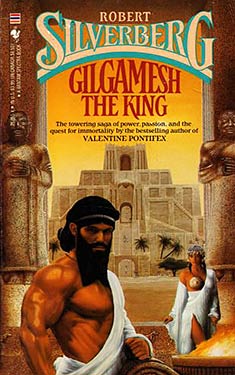Robert Silverberg
Completed 9/3/2015, Reviewed 9/8/2015
4 stars
The “Epic of Gilgamesh” is an ancient epic Sumerian poem
about the exploits of Gilgamesh, the greatest king of Uruk in Mesopotamia. It tells the tale of how he overworked his
people to build a great kingdom, his friendship with the wild man Enkidu who
was sent by the gods to distract him, his battles with the goddess Inanna, the
earliest account of the great flood, and his journey seeking immortality. Silverberg’s book is a novelization of the epic
with some liberties taken, particularly the interaction with the gods. The result is a highly readable retelling of
what is considered the first piece of literature in human history. I was completely engrossed in the book, both
from an historical perspective and by the wonderful prose that Silverberg is known
for.
 Gilgamesh is an unreliable narrator. This becomes evident as the book
progresses. Being told in first person,
it paints him as a great, likeable hero, only eventually revealing to the
reader that his perspective might be flawed.
This is a wonderful device drawing the reader into his personal
struggles from his exile as a child to his claiming of the throne, then to his
rebuilding of the kingdom. But rumors
abound that his people are exhausted from his seemingly unending supply of
energy, his only distraction appearing to be his loneliness for intimate
companionship. That’s where the veneer
of infallibility is first cracked. Of
course he has a harem of many wives, but we figure out he suffers from a few complexes. To remedy this and to provide relief to his
people, the gods send him a friend, Enkidu, a man who was raised by wild
animals, the only man who can challenge him, and get him a little past his
self-absorption.
Gilgamesh is an unreliable narrator. This becomes evident as the book
progresses. Being told in first person,
it paints him as a great, likeable hero, only eventually revealing to the
reader that his perspective might be flawed.
This is a wonderful device drawing the reader into his personal
struggles from his exile as a child to his claiming of the throne, then to his
rebuilding of the kingdom. But rumors
abound that his people are exhausted from his seemingly unending supply of
energy, his only distraction appearing to be his loneliness for intimate
companionship. That’s where the veneer
of infallibility is first cracked. Of
course he has a harem of many wives, but we figure out he suffers from a few complexes. To remedy this and to provide relief to his
people, the gods send him a friend, Enkidu, a man who was raised by wild
animals, the only man who can challenge him, and get him a little past his
self-absorption.
My one problem with the book is that Silverberg had to note
that the relationship with Enkidu was not a gay relationship, but one of
extreme filial love, and wrestling. It’s
like he had to appease the censors who thought the relationship was too
homoerotic. I mean, come on, they were
always wrestling. Considering they never
engaged in sexual relations, I think it would have been fine to have left this
statement out, leaving it ambiguous.
Considering Gilgamesh’s huge harem of wives and insatiable appetite for
them, I think it’s much more believable to postulate that he was bisexual, and
a similar book written today probably would have allowed that.
Dovetailing on this, one of Gilgamesh’s duties as king and
representative of the consort Dumuzid, is to have an annual encounter with the
priestess who is the representative of the goddess Inanna. What’s significant about this is that this
priestess is really the only woman he loves.
It creates a great sexual tension that permeates all of Gilgamesh’s
thoughts and actions. The introduction
of Enkidu creates a triangle that sets the tone for the rest of the book and
the tragedy that follows.
Perhaps my favorite part of the book is Gilgamesh’s
relationship to religion and the gods.
While he performs all the religious rituals necessary of a king, he also
has a very modern, almost cynical view towards them. It sets up a battle of the sexes and
secularism, with religion represented by a women and the state represented by a
man. This multi-layered conflict is threaded
throughout the latter half of the book, creating the exciting denouement that
finishes the novel. I know there is a
sequel, where Silverberg pulls out more stories from the original Epic,
including the journeys through the underworld, but this conclusion is quite
satisfying.
I’ve only read one other Silverberg book, but considering he
never won a best novel Hugo, he seems to be one of the more underappreciated
writers of the golden era. And I think
that many SF readers are missing out one of the era’s best. Silverberg’s prose is wonderful. It never gets too haughty, but still feels
literary. Exemplified in this book, the
words, plot, and images simply flow like water, making the reading experience a
delight.
Despite my one concern, I give this book four stars out of
five. I was completely engrossed in the
book and the characters. This was
another one my used paperback purchases from Orycon with pretty small font, and
I thought I’d have trouble with that as well as the fact that this is basically
historical fiction with a little mythology thrown it. But it proved me wrong and Silverberg remains
one of the authors I just have to read more of.
No comments:
Post a Comment